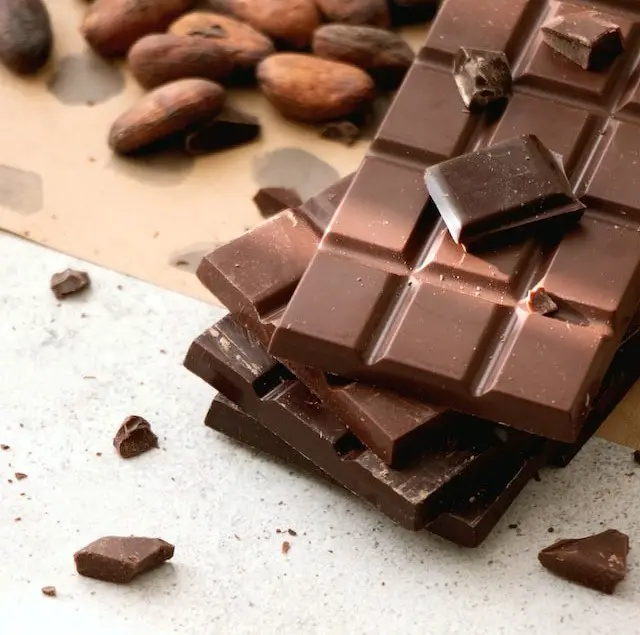“Will consuming chocolate lead to weight gain?” The one question that’s on the mind of every health fanatic.
You often avoid sweets, but that chocolate bar with caramel and almonds is calling your name.
But does it possess the power to halt or reverse your weight loss progress?
Well, maybe. A single chocolate bar will not derail any diet, however, consuming it on a regular basis without accounting for its calories could tip the scales.
Even while dark chocolate offers significant health benefits, though, similarly, overconsumption of dark chocolate too can lead to weight gain.
But not all the news is negative. Learn how chocolate can affect your weight and how to avoid gaining weight when eating it.
Our utmost priority here is to enable individuals to experience a fulfilling, long, and productive quality of life.
Therefore, we take note when research indicates that consuming a particular food, such as chocolate, will help you live longer and perhaps even keep you skinny.
To be honest, we too, just like you, enjoy chocolate. However, we have also read that chocolate consumption contributes to weight increase.
So, what is the correct course of action? Should health and wellness professionals start munching on chocolates and advise others to do the same?
Now that would be very wrong, wouldn’t it?
In fact, we believe experts should never rely on a single study. Consider numerous studies, placing greater emphasis on systematic reviews and meta-analyses.

One renowned health professional recently claimed that “It’s preferable to have a synthesis of all studies to get to the bottom of things.”
“When reviewing a paper, you should not just look for the best available information, but also for reliable sources.”
Regarding chocolate bars, it’s not just the calories; it’s also the sugar. Sugar is a concentrated source of energy, yet it does not satisfy hunger.
Even after consuming a high-calorie bar, you may have hunger pangs within an hour or two. Whereas a 600-calorie dinner consisting of lean proteins, complete grains, and vegetables would have kept you full for hours.
Moreover, the sugar in chocolate might cause a surge in blood sugar levels.
And when your body goes overboard with diminishing your blood sugar (the dreaded blood sugar “crash”), you will become irritable and anxiously await your next meal.
Let’s Take A Look At Some Evidence
There are numerous research that advocates both sides of the chocolate debate.
We feel moderation may be the answer after analyzing some papers on this topic, including meta-analyses and systematic reviews of randomized trials.
Chocolate is known for being rich in fat, sugar, and calories. And excessive consumption will result in weight increase.
And, as you are aware, obesity has substantial detrimental effects on health. However, a small amount of chocolate, especially dark chocolate rich in polyphenols, may provide some health benefits.
The darker the chocolate, the healthier it is due to the higher polyphenol content.
It has been proven that consuming chocolate in moderation can help enhance cholesterol levels, improve LDL, HDL, boost insulin sensitivity, and reduce blood pressure.
Several prospective studies have linked chocolate consumption to reduced cardiovascular and overall mortality.
Chocolate is a highly rich source of cardiovascular-protecting antioxidants, including catechins and polyphenols. These cocoa-derived antioxidants improved capillary development and muscle performance in animal research.
In rats, these nutrients also decreased body weight and enhanced lean muscle growth— without exercise or caloric restriction.
People who consume chocolate frequently had a lower body mass index (BMI) than those who consume chocolate less frequently, according to one study.
Even after correcting for confounding variables such as physical activity, this remains the case. Similar research that examined the health advantages of chocolate and cocoa support these findings, despite their seeming illogic.
The authors of this study stated, “Our findings that chocolate consumption is associated with a reduced BMI are intriguing.”
If you prefer chocolate, particularly dark chocolate, consuming a small amount may not be harmful and may even be good.
Add a little additional movement to your chocolate just to be safe. It will assist you in burning the extra calories.
Try a cup of hot chocolate if you don’t want the fat and sugar included in most chocolate confections.
The advantage lies in the chocolate itself, not in the additional sugar and fat.

Furthermore, the chocolate business did not fund this research. It was financed by a grant from the Heart, Blood, and Lung Institute of the National Institutes of Health and done by the University of California, San Diego.
A recent comprehensive assessment of clinical trials including chocolate showed that there is a little, but a statistically insignificant drop in body weight and body mass index (BMI).
Chocolate consumption had no influence on waist circumference.
However, the authors of the study noted previous chocolate studies have been conducted on small populations and recommended that future trials include bigger populations.
How much dark chocolate can one consume? According to a new meta-analysis of 23 research, the optimal quantity of chocolate to reduce cardiovascular risk is 45 grams per week, or roughly four squares.
However, keep in mind that these four squares add more than 200 calories to your diet.
We are committed to evidence-based, scientifically confirmed science. We encourage proper nutrition, including a minimal sugar intake, in conjunction with adequate physical activity for maximum health.
Go ahead. If you wish, have a tiny square of dark chocolate a few times per week. Just watch out for added calories, fat, and sugar.
How to Incorporate Chocolate into a Healthy Diet
This does not mean that you must completely abstain from chocolate; simply practice portion control, such as having a tiny square of chocolate with a nutritious meal.

Get your chocolate fix with options that are lower in calories and sugar, such as very dark chocolate or dishes made with cocoa nibs or powder.
Reserve ultra-sweet chocolate bars for special occasions. Slowly chew and relish each bite; you’ve earned it!
